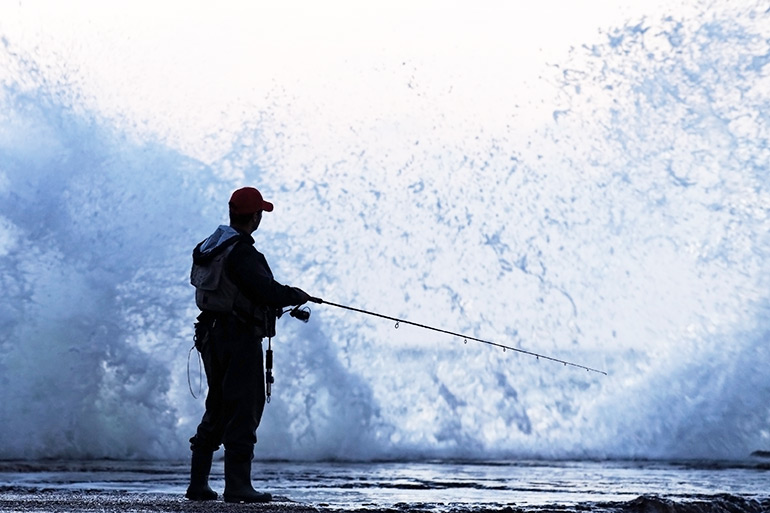How to Prepare for Montauk's Fall Striped Bass Blitz

Each year, throngs of the fishing devout gather waders, tackle and surfcasting rods and make their annual pilgrimage to the Montauk rocks for the fall striped bass and bluefish blitz. Few can deny the thrill of braving the crashing surf and casting into waters boiling over with hungry, migrating fish.
The South Fork, particularly Montauk, has become a world-renowned fishing destination, especially in autumn, and any angler worth his or her salt should come prepared. A person needs to know what they’re fishing for and how to catch them—there’s little point to embarking on this adventure blind.
RELATED – Catch & Eat: Fishing Regulations + Cooking Tips for the East End’s Freshest Fish

“This is a real special time of year if you’re a fisherman,” explains Moon Pie Charters Captain Harvey Bennett, a 38-year veteran of the local fishing industry and owner of The Tackle Shop Inc. in Amagansett. “This is when you want to be here,” he says, acknowledging that the advent of social media and all the exciting fall fishing videos online are bringing visitors from around the globe. “It’s quite an industry now.”
The season for striped bass, the East End’s most famous and coveted fish, starts on April 15, just as water temperatures begin to warm after the long winter. The stripers get active and start biting for about two months, until mid-June when summer’s heat sets in and the fish get lethargic. “They don’t feel like eating,” Bennett says, adding, “I don’t feel like eating when it gets warm.”
But before long, the nights get colder, autumn takes hold, and the real fishing begins. Bennett points out the “zone of temperature that fish will turn on to” is like that perfect 65–74 ° in a house: “Seventy-five is too hot,” he says, and 62 is too cold.”

With water temps back in the preferred zone, and fish beginning their migration south for the winter, September and October are prime time for catching renowned fighters such as striped bass, bluefish and false albacore/bonito, along with porgies and weakfish.
Meanwhile, black sea bass season—which was great this summer—ended on August 31; and fluke (aka summer flounder) fishing has died off, though the season continues through September 30.
Stripers are the big draw for fall, but Bennett says the other species should not be discounted. False albacore are the most common tuna in the Atlantic, though they’re more closely related to mackerel. And while they’re far from delicious—passable if you’re willing to marinate the bloody, dark and oily meat copiously—the fish are among the fiercest fighters in our waters.
Bennett says a 5–6 pound false albacore will fight like a 30-pound bass. “They fight to the death,” he adds, but says they’re finicky fish that seem to respond best to fly fishing tackle.
To catch stripers, Bennett says most locals use a diamond jig with a tube tail, mimicking sand eels, or a bucktail with synthetic pork rind (unless you can find the real stuff) or a rubber Berkley Gulp! lure. Fishermen are limited to keeping one striped bass per day and it must be at least 28 inches long, so trophy hunters may want to hold out for a true cow, even if smaller sizes are best for eating. Bass season ends on December 15.

Blues can be caught year-round (15 per day), minimum 12 inches, after the first 10 fish. When these energetic fighters are feeding, pretty much any reasonable lure or bait will do. Seek out flocks of birds to find waters exploding with bluefish below them, and use a shiny metal spoon lure with wired leader to protect your line from their sharp teeth.
Another fishing mainstay, the porgy (aka scup), is a lifesaver for local charters, Bennett says, explaining that they’re “a great fill-in while we have these doldrums of other food fish.” Fisherman can take 30 per day, minimum 9 inches, through December 31. And they’re not bad to eat, especially blackened.

Novices looking to get in on the fun should be careful on the Montauk rocks, maybe sticking to the sandy beach instead, until you’ve gained some experience. Talk to local fishermen, tackle shop owners and charter captains to learn the truly best secrets, which most hold so dear, and get out there before blitz season is over.



